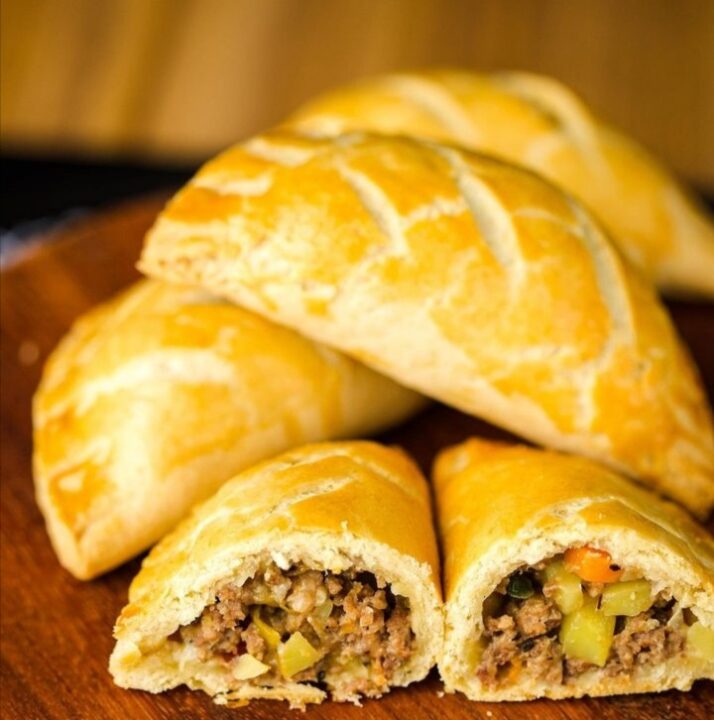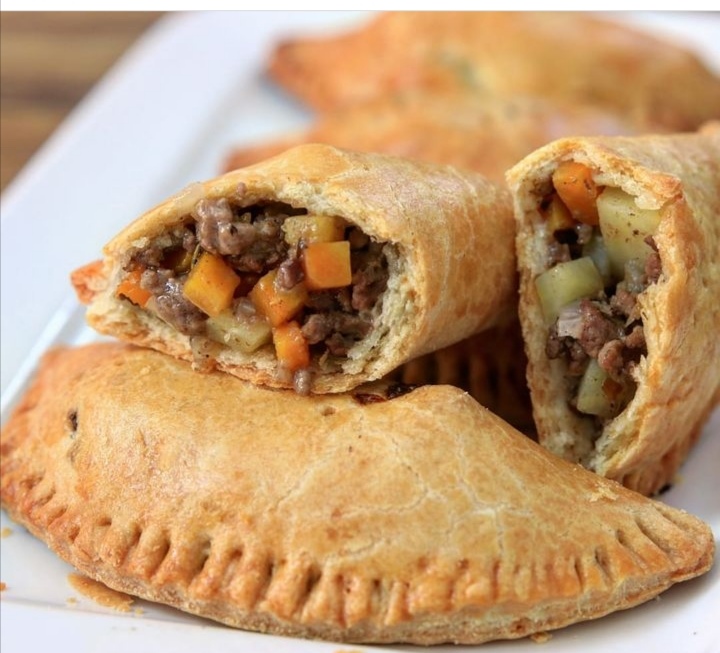Meat pie is a nice appetizer to take while you wait for your main course meal. Meat pie is a pie with a filling of minced meat and other proteinous, savory ingredients. They are found in cuisine menus worldwide. Nigeria or the Republic of Nigeria, is a west African country with diverse tribes and over 250 ethnic groups.
Meat pie is made with wheat flour, carrots, sweet potatoes and meat, It is usually baked in an oven, shallow fried with oil or deep-fried; it could also be locally baked in smoke oven, but by whichever means used, the aim is to develop the flour through the maillard reaction, that is to ensure the chemistry reaction of reducing sugar by heating.
The topic , Nigerian meat pie, is set to talk about how meat pie is made in Nigeria by Nigerians precisely, how it came to be in Nigeria, its benefits economically and healthwise and all these will be discussed in this article.
Nigerian Meat pie
Nigerian Meat Pie is a savory, filling snack traditionally filled with minced meat, carrots and potatoes. Lagos as a result of British trade. Meat pie is one of the most popular snack foods in Nigeria and it’s sold in restaurants, roadsides, etc. It has a flaky crust on the outside and is warm and gooey on the inside. The Nigerian meat pie is an easy recipe everyone can afford and it has a good number of health benefits.
History of Meat pie
The history of meat pies in Nigeria is a mix of cultural influences, culinary evolution and entrepreneurship. They were introduced during British colonial times. These pastries were introduced in England by the Greeks and Romans, Meat pies initially catered to the elite and British expatriates.
Over time, they became accessible to the general population, adapting to local tastes and preferences. By the 1970s and 1980s, meat pies had transformed into a popular central Nigerian street food because they were not owned by any ethnic group or tribe; they were owned by all.
How To Make Meat Pie

Making the Nigerian meat pie will involve quite a few affordable ingredients and equipment, or apparatus, with instructions and a few important rules.
Equipments
- Large mixing bowl
- Knives set
- Utensil set
- Dough cutter.
Ingredients
- Pie dough
- 500 grams all-purpose flour, 4 cups
- M8 grams salt, 1 ½ teaspoons
- 240 grams unsalted butter 2 sticks
- ½ cup plus 2 tablespoons of cold water
- Pie filling
- 450 grams ground beef or minced beef
- 1 large potato, diced
- 1 carrot, diced
- ½ teaspoon Curry
- ½ teaspoon Thyme
- ½ teaspoon chili pepper
- 1 teaspoon Garlic powder
- ¼ teaspoon salt
- 1 seasoning cube Bouillon cube
- 2 tablespoons flour
- ¾ cup water
- Seasoning for pie filling
- Knorr
- Powdered Pepper
- Cumin
- Flour
- Egg wash
- 1 medium egg
Instructions
Making The Dough
- In a large bowl, combine the flour and salt.
- Add cubed butter and crumble with your hands or with a butter cutter until it looks like bread crumbs.
- Add cold water and mix just until the dough comes together. Do not overmix or knead the dough.
- Divide in two, cover with plastic wrap and refrigerate or keep in a cool, dry place.
For The Filling
Peel and wash potatoes, carrots, and dice. To a hot pan, add vegetable oil, just enough to fry chopped onions, sauté. When the onion is soft, add ground or minced beef and cook until no longer pink.
Add seasoning cubes, salt, thyme, curry, garlic powder, and chopped pepper (or dry) and stir until combined. Add diced potatoes, carrots and flour to thicken. stir. Add the water or meat broth, cover and cook on low heat for about 15 minutes.
Pour out the pan contents onto a wide, shallow plate and allow to cool completely.
To Assemble
Preheat the oven to 350°C or 175°F. Cut with a dough cutter, round plate or small pot cover.
Remove dough from the refrigerator and transfer to a floured surface. Cut dough into small pieces, then roll out to about ¼cm thick.
Brush around the edge with egg wash (this will help seal the dough)Add cooled filling, cover and crimp with a fork. Brush with egg wash, then Poke holes with the fork (the holes act as an air vent, which will help the steam escape while the pie is baking).
Line a baking tray with parchment paper and transfer. Bake pies in a preheated oven at 350°f or 175°c for 45 minutes. Take the meat pie out of the oven and enjoy it, hot or cold.
Unarguably, the procedure for which the Nigerian meat pie is made is lengthy compared to other pies but the Nigerian meat pie that will be produced is also worth the wait.
Rules To Baking
There are a few don’ts in the making of meat pie that, if followed appropriately, yield a very good meat pie.
1. Do Not Over-mix The Dough
After adding the water, mix just until combined and stop. Dough will be lumpy and that’s okay. Overmixing allows the gluten in the flour to develop into elastic strands, which creates a gummy, tough and chewy dough.
2. Keep the butter cold
This tip makes the whole process a breeze and that’s why this recipe calls for cold water, as it helps to keep the butter solid after crumbling with warm hands. Cold butter is much easier to roll and work with than soft butter/margarine.
3. The Pie Should Be Cooled
Make sure pie filling is completely cooled before use, as using a hot/warm filling will melt the butter in the dough, resulting in a greasy crust.
Refrigerating the dough helps the butter solidify so it’s easier to work with. When poking holes in the pie, make sure the fork goes through the top part of the dough.
Also, while making the pie, keep unused dough in the fridge or in a very cool place so the butter remains cool and solid. Nigerian meat pie can be preserved after being baked by placing them in airtight containers and then placing them in a refrigerator, but it must be consumed within 5 days.
Benefits of a Typical Nigerian Pie
Nigerian Meat pie is sometimes considered as junk food so it is half junky and also half healthy; however, it is the best pastry to use as breakfast as it makes a complete breakfast diet.
Health Benefits
Meat pie has a good quantity of health benefits. The red meat used to make the filling is high in tryptophan, an amino acid crucial to making the happiness hormone serotonin.
Serotonin is a winning combination. The red meat also contains high levels of iron, which is vital for healthy red blood production. Carrots are medically recommended vegetables known for its high propensity of vitamin A, which is good for the eyes and also a cell protector and an antioxidant. Also, carrots do have anti-diabetic properties.
Sweet potatoes, also used for the filling of meat pie, are a highly nutritious fiber rich in antioxidants, vitamins and minerals that help promote good health and improve brain function.
Furthermore, the carbohydrate from the crusted top of the meat pie also speeds up its journey to the brain, making it the perfect match; carbohydrates act as fuel to the body. They help fuel your brain, kidneys, heart muscles, and central nervous system.
Wheat flour, which is also fiber, is a carbohydrate that aids in digestion, helps you feel full, and keeps blood cholesterol levels in check. The body can store extra carbohydrates in your muscles and liver for use when you’re not getting enough carbohydrates in your diet.
A carbohydrate-deficient diet may cause headaches, fatigue, weakness, difficulty concentrating, nausea, constipation, bad breath and vitamin and mineral deficiencies. Sadly, meat pie is not to be taken as an everyday diet because a high percentage of fat can be taken in from the meat.
Other Benefits
Starting a meat pie business in Nigeria will be very profitable since it is a very popular snack food in the country. However, the quality of the meat pie, the marketing strategy in use and the location of the business will determine the profitability of the business.
Conclusion
Nigerian meat pie, as introduced to Nigeria during British colonial rule, resembles Cornish pasties and Jamaican beef patties in appearance but actually differs in many ways. The pastry for meat pies, same as with Jamaican beef patties, is a shortcrust made with cold water, not hot water, which is traditional for Cornish pasties.
Butter or margarine are the fats of choice in meat pies, unlike suet in Jamaican patties and lard or white shortening in Cornish pasties. Also, the filling for Cornish pasties is uncooked prior to stuffing, while the filling for Nigerian meat pies is cooked beforehand. Jamaican patties are not to be confused with Nigerian meat pies, they are both distinguished pastries.



